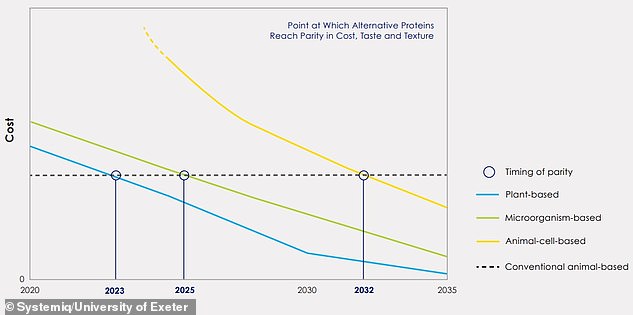Vegan burgers should be served in schools and prions, scientists say
>
Vegan food should be served in schools, prisons and hospitals to promote its popularity with the general public, a new report argues.
Bringing plant-based burgers, sausages and fillets to the kitchens of such public institutions could trigger a shift away from animal meat, it says.
Cutting red meat intake can improve our health but also that of the planet, as livestock farming at scale destroys habitats and pumps out CO2 and methane.
The new report say there are ‘social norms’ around meat consumption that need changing, although taste, texture and nutrition of ‘fake meat’ still needs improving.
Plant-based food should be served in schools and prisons to trigger a shift away from meat and help the climate crisis, a new report argues. Pictured, plant burgers (file photo)
The new report has been authored by experts at sustainability consultancy Systemiq in partnership with the University of Exeter, who make a series of recommendations for accelerating net zero.
‘Shifting to alternative proteins, thereby cutting demand for meat production, could reduce both pressure for land use change and emissions from livestock farming,’ they say in the report.
‘Favouring alternative proteins in public procurement policies globally could help to bring forward tipping points in their adoption.
‘Using public institutions (e.g., government offices, hospitals, prisons, schools) to purchase alternative proteins in large quantities would rapidly increase demand and help producers to achieve economies of scale, thereby lowering costs.
‘By introducing large numbers of consumers to these products, public procurement can also enhance accessibility and help to shift social norms around meat consumption.’
Already, alternative proteins are projected to reach around 10 per cent of the market share by 2035, but this could be pushed to 20 per cent with such a policy change.

The report suggests bringing plant-based ‘meat’ to public institutions such as schools, although there’s been fears it’s not as nutritious as real meat (file photo)
The authors note, however, that plant-based meat still has to change to appeal to more customers – namely, achieve taste and texture that more closely resemble animal protein, which will require significant ‘technological innovation’.
Plant-based meat will also have to overcome health and dietary concerns, as some fear that it’s not as nutritious as real meat.
Previous research has shown that some alternative meat products contain excessive amounts of salt.
Once these issues are overcome, plant-based protein must also be easy to purchase in shops, online and in restaurants, they say.
Apart from plant-based, there are several other alternative forms of protein such as algae, insects and even cultured (lab-grown) meat.
But plant-based proteins are the closest to reaching parity with animal meats in terms of cost, taste and texture, the experts point out.
The authors acknowledge progress that has been already made, as plant proteins are now present in most prominent fast food chains.
Burger King sells plant-based burgers over the world, including its Whopper made from soy protein, while McDonald’s McPlant is sold across Europe, including the UK.
Plant products have also become much more prominent in supermarkets, many of which have set up dedicated vegan sections in the past few years.
However, more research is required to see what role supermarkets have in helping the shift to these alternatives, the report says.
Overall, cutting demand for meat production could reduce both pressure for land use change and emissions from livestock farming.

Apart from plant-based, there are other alternative forms of protein such as algae, insects and even cultured (lab-grown) meat. But plant-based proteins are the closest to reaching parity with animal meats in terms of cost, taste and texture, the experts point out

Burger King sells plant-based burgers over the world, including its Whopper made from soy protein, while McDonald’s McPlant (pictured) is sold across Europe, including the UK
A reduction in livestock farming could free up somewhere between 400 and 800 million hectares of land, the report says, citing previous research.
This is equivalent to seven to 15 per cent of agricultural land today, which could help grow a greater volume of food to feed the world’s growing population.
Bringing plant products to public institutions is identified as one of three ‘super leverage points’ – where a small intervention can cause a large beneficial effect on the climate.
The others are mandating vehicles with zero emissions and ‘green’ ammonia (ammonia made with renewable energy) for fertilizers.
Overall, significantly more action across all sectors is needed this decade to keep the Paris Agreement’s goal of limiting global warming to 2.7°F (1.5°C) within reach, the report says.

